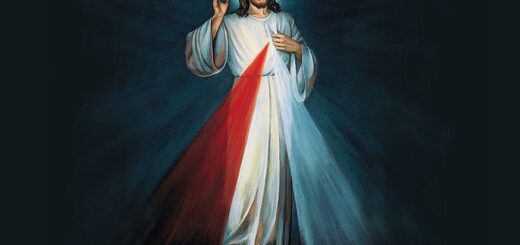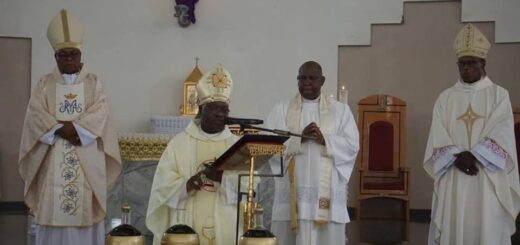Coexistence of Pain and suffering and God’s Intervention
by ARCH BISHOP · February 7, 2021
Fifth Sunday, Year B, Homily by Archbishop I. A. Kaigama at St. Jude’s Parish, Zuba, February 7, 2021.
Readings: Job 7:1-4, 6-7; Ps. 146(147): 1-6; 1 Cor. 9:16-19, 22-23; Mk. 1:29-39
Recently, I have been asked all kinds of questions about the coronavirus pandemic. Is it real? Is it an artificial disease created and spread so that some people can make money through the manufacture of vaccines? Are the vaccines safe or are they a means to control population growth of Africans? Is the COVID-19 pandemic a punishment from God? Is it signalling the end of the world? Could it be that God wants to do away with the people of the present generation who commit corruption of pandemic proportions and all forms of evil as in the days of Noah (cf. Gen. 6:5) when evil and wickedness multiplied?
Despite all these questionings, the fact remains that in the last weeks, Monsignors, priests and prominent individuals have succumbed to the hands of death on account of coronavirus disease. The economic difficulties on account of the coronavirus pandemic are palpable. People ask why suffering exists in the world, natural or man-made.
Today’s first reading about the suffering of Job partly explains the problem of evil and human suffering. Life is not a bed of roses. Pain and suffering and joy and fulfilment coexist, but our faith teaches us that the suffering of Jesus gave meaning to our sufferings. Even though God permits suffering to take place, He intervenes in human situations to alleviate suffering.
The response to our psalm today, “Praise the Lord who heals the broken-hearted,” shows that no one is immune to suffering, which comes to all regardless of age, religion, ethnic affiliation, gender, race, and social status.
The first reading describes the agony of Job: “I have been allotted months of futility, and nights of misery have been assigned to me. When I lie down I think, “How long before I get up? The night drags on, and I toss and turn until dawn” (Job 7:3-4). Note that Scripture describes Job as a blameless and upright man who feared God and avoided evil and was blessed with many material possessions (cf. Job 1:1-3). Humanly speaking, Job did not merit going through such sufferings. The bitterness of suffering almost plunged him into despair that he was unable to see the happiness that lay ahead of him.
The advocates of a cross-less Christianity (prosperity and miracle preachers and their adherents) teach that “suffering is not our portion”. Jesus does not however present Himself as one who prevents suffering but as one who redeems and heals us even in times of adversity as He did to Simon’s mother-in-law, healing her of fever (cf. Mk. 1:29-31). Being a Christian is not an insurance policy against suffering and hardship, but even in sickness we believe that as Jesus healed many sick people and liberated those possessed by devils He will do the same for us.
There is no doubt that our world is currently sick, ravaged by the COVID-19 pandemic. We ask Jesus to intervene to heal us, but we must accept life with great optimism as Job did when he surrendered all his sufferings to God’s greater wisdom and power to save (cf. Job 42:1-6). We are called to live by faith as Job and not to lose our faith and joy when tested by fire (cf. 1 Peter 1:7).
The fear in Africa today is that the menace of Coronavirus will continue to be with us for a long time, and so we need to be watchful and vigilant. Many in Nigeria however ask if the vaccines are medically safe and whether the poor can also benefit from them, considering that even the palliatives meant for the needy ended up in the homes of a few favoured ones or were needlessly hoarded in warehouses!
The other fear is that if it takes so much time and money now to do a test for COVID-19, will it be that easy for the poor to have access to the vaccine? As basic as the face mask which is seriously recommended to be worn by everyone is, I have seen individuals wearing dirty face masks for days because they cannot afford new ones, another reason for more infections!
I understand that the Independent National Election Commission (INEC) is considering increasing the polling units in Nigeria to beyond the present 119,973. Could the same polling units be used as free vaccination or face masks distribution centres? We recommend that before vaccinating Nigerians, our medical experts must ensure that the vaccines have been subjected to appropriate tests for genuineness and are properly stored, to allay the fear of contamination.
Even though many today seriously question facts about COVID-19 and fear that there is manipulation by some people, we know that the disease is real. People very dear to us have died of coronavirus disease. In the midst of this health crisis, the world must realize as Pope Francis said during the first International Day of Human Fraternity, that “there is no time for indifference” and “we cannot wash our hands” off the present situation with distance, disregard and contempt. We are either brothers or sisters, “or everything falls apart.”
To the candidates of confirmation, as you receive the Holy Spirit to fortify you in grace as mature Christians, remember what St. Paul says about preaching the Gospel (cf. 1 Cor. 9:16) especially the “gospel of fraternity”. I urge that in all the circumstances of your life, remain solidly rooted in the Lord Jesus and do not yield to superstition and wander from one juju healer to the other.
In the midst of the coronavirus health crisis, we pray that things will return to normalcy soon and our God who is the same yesterday, today and forever (cf. Heb 13:8) will grant us both spiritual and physical healing.



